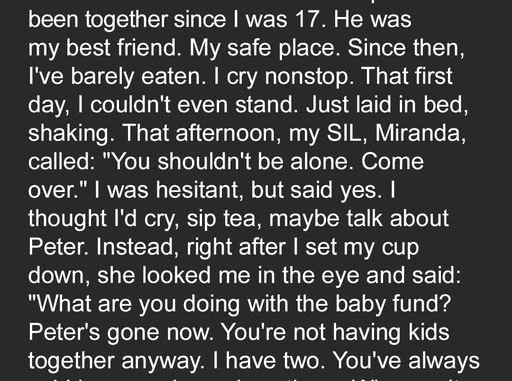
After losing my husband, I sought comfort from my sister-in-law, only to face a heartless demand that deepened my pain. But an unexpected ally showed me who truly cared.
I’m Emily, 32, and when my husband died, my world shattered. A visit to my sister-in-law for solace turned into betrayal, until family showed me love isn’t about what you can give.
Grief isn’t a quick blow—it’s a slow suffocation, stealing your air while life moves on. Four weeks ago, Tom, my husband since I was 18, died in his sleep. His arm was warm around me at midnight; by dawn, he was gone, cold beside me. I screamed as paramedics tried and failed to save him.
A blood clot in his lung, they said. Days earlier, he’d mentioned leg pain. I thought it was nothing. Now, I scoured websites about pulmonary embolisms, seeing every missed sign. If I’d pushed him to the doctor, he’d be alive. Guilt consumed me.
I couldn’t eat, couldn’t move, curled in our bed, clutching Tom’s jacket, its cedar scent fading. He was my home, my constant. Now, I was adrift.
My phone buzzed—Lisa, my sister-in-law. “Emily, come over,” she said gently. “You shouldn’t be alone. I’ve got coffee.”
Her kindness felt like a lifeline. Tom was her brother; she’d hurt too. “I’ll come,” I whispered, pulling on Tom’s sweater, its sleeves swallowing my hands. In the mirror, I looked hollow, eyes red from tears and regrets.
Lisa’s hug at the door felt stiff, her house smelling of bleach and lasagna—normal smells that stung. “Coffee’s hot,” she said, guiding me to her couch. I sipped, the bitterness grounding me, expecting shared tears.
Instead, Lisa leaned in, eyes sharp. “What’s happening with the baby fund?”
I froze. “What?”
“Tom’s gone, so no kids for you,” she said. “My boys need that money for college. You love them, right? It’d help us out.”
The baby fund—Tom and I saved for years, dreaming of cribs and diapers. Now, it was a ghost of our plans, untouched in my grief. Lisa’s casual math stunned me.
“And,” she added, sliding a list across the table, “help with the boys this week. It’ll keep you busy.” The paper listed tasks: drive kids to soccer, tutor math, bake for the bake sale, craft for a school project.
“Better than moping, right?” she chirped, like she was saving me.
Tears spilled, raw and unstoppable. I could barely breathe, and she wanted me to bake? Play mom to her kids? “Lisa, I can’t—”
“Don’t dwell,” she cut in, waving off my tears. “Move on, Emily.”
Move on? Tom’s absence haunted me—his still body, my failure to save him—and she thought cookies would fix it?
A knock interrupted. Lisa sighed, “Probably a lost delivery guy,” but it was Helen, my mother-in-law, storming in, eyes blazing.
“Lisa, you’re not touching that money,” Helen snapped.
Lisa gaped. “Mom, what—”
“Your windows are open,” Helen said, pointing. “I heard it all. You’ve leaned on me for years, and now you’re using Emily’s grief for cash and babysitting? Shame on you.”
Lisa flushed. “I was helping her!”
“You were helping yourself,” Helen said coldly. “Emily’s mourning. Leave her alone.”
To me, she softened. “Go home, dear. I’ve got this.”
I mumbled, “Thank you,” and fled, hands trembling as I drove. Lisa’s selfishness shocked me—she’d always been pushy, but this? Helen’s defense was unexpected; she’d been reserved since Tom’s dad died, but now she stood up for me.
At home, in Tom’s chair with cold tea, my phone lit up. Lisa texted: You turned Mom against me. Hope you’re proud. Stop making it all about you.
Her words stung, but I deleted them, silencing my phone. Tom’s voice echoed: “Some love you for what you do, Emily. Others love you for you.”
Helen loved me, not for utility but for Tom, for me. She knew my pain, having lost her husband, raising kids through grief.
I’d call her tomorrow. For now, I held Tom’s jacket, letting tears fall, knowing I wasn’t as alone as I’d thought.